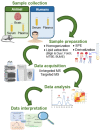Adaptation of Lipid Profiling in Depression Disease and Treatment: A Critical Review
- PMID: 35216147
- PMCID: PMC8874755
- DOI: 10.3390/ijms23042032
Adaptation of Lipid Profiling in Depression Disease and Treatment: A Critical Review
Abstract
Major depressive disorder (MDD), also called depression, is a serious disease that impairs the quality of life of patients and has a high incidence, affecting approximately 3.8% of the world population. Its diagnosis is very subjective and is not supported by measurable biomarkers mainly due to the lack of biochemical markers. Recently, disturbance of lipid profiling has been recognized in MDD, in animal models of MDD or in depressed patients, which may contribute to unravel the etiology of the disease and find putative new biomarkers, for a diagnosis or for monitoring the disease and therapeutics outcomes. In this review, we provide an overview of current knowledge of lipidomics analysis, both in animal models of MDD (at the brain and plasma level) and in humans (in plasma and serum). Furthermore, studies of lipidomics analyses after antidepressant treatment in rodents (in brain, plasma, and serum), in primates (in the brain) and in humans (in plasma) were reviewed and give evidence that antidepressants seem to counteract the modification seen in lipids in MDD, giving some evidence that certain altered lipid profiles could be useful MDD biomarkers for future precision medicine.
Keywords: depression; inflammation; lipidomics; major depressive disorder; mass spectrometry; oxidative stress.
Conflict of interest statement
The authors declare no conflict of interest.
Figures
References
-
- American Psychiatric Association . Diagnostic and Statistical Manual of Mental Disorders. 5th ed. American Psychiatric Association; Washington, DC, USA: 2013.
-
- World Health Organization Depression—WHO. [(accessed on 20 December 2021)]. Available online: https://www.who.int/news-room/fact-sheets/detail/depression.
-
- Estrela M., Herdeiro M.T., Ferreira P.L., Roque F. The Use of Antidepressants, Anxiolytics, Sedatives and Hypnotics in Europe: Focusing on Mental Health Care in Portugal and Prescribing in Older Patients. Int. J. Environ. Res. Public Health. 2020;17:8612. doi: 10.3390/ijerph17228612. - DOI - PMC - PubMed
Publication types
MeSH terms
Substances
LinkOut - more resources
Full Text Sources
Medical


